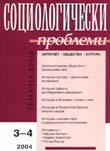

Keywords: mathematical existence; immanent transcendence; constitutional analysis; constructivism; hermeneutic fore-structure
Th e paper attempts to elucidate and evaluate Oskar Becker’s search for a complementarity between the paradigm of constitutional analysis put forward by Heidegger’s hermeneutic phenomenology and constructivism as a meta-mathematical position suggesting criteria for existence of the mathematical objects. At stake is the issue of the possibility of an existential analytic of “the mathematical”. In this regard, a special attention is paid to the temporality of “mathematical existence”. The paper invites new forms of a dialogue between phenomenology and philosophy of mathematics.
More...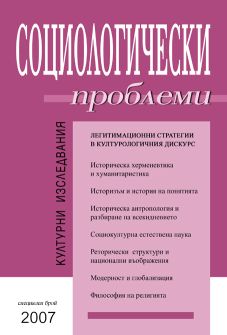
During the early nineteenth century the German humanities passed consecutively through a transition that resulted in their constitution as modern scientific disciplines. This structural transformation occurred first in the field of philological and historical disciplines. Thus the paper examines its major characteristics: 1) the forms of institutionalization of humanities; 2) the scientification of the human studies; 3) the new cognitive identity; 4) the disciplinary fission; 5) the social (in-)utility of humanities; 6) the cognitive emancipation of humanities from speculative philosophy and from the natural sciences.
More...The discussion proceeds from the ambiguous concept of "globalization". In seeking a possible minimal area of consensus as to the contents and legitimacy of the term, the author points to the generally shared view that in the epoch of modernity, there is a tendency to intensifying the economic, political, and cultural intercourse between separate geographic regions and states, a tendency which decreases the differences between them, and hence leads to the homogenization of culture. This process is perceived as irreversible. The article raises the question of the forms in which different cultural traditions exist in the context of globalization. The author then examines the two fundamental ways in which the modern European cultural self-consciousness responds to tradition: anti-traditionalism and traditionalism. He concludes that the premise of both responses lies in the break in traditions through countering their power. This break occurs by abandoning the view that people inhabit a completed, permanent kind of world, by the new conviction that the world can be different from what it is. For antitraditionalists, this break in traditions is a gain of liberty; to traditionalists, it represents a loss of identity. The answer to contemporary anxiety about the survival and purity of cultures lies in the "care for traditions". Measures for such care would preserve the authentic features of cultures, but only by isolating them in special, well-guarded cultural "reservations". The author concludes that the care for cultural traditions is a specific way in which traditions live on in the epoch of globalization.
More...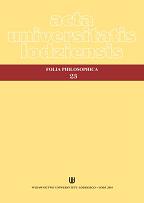
Keywords: renaissance notion of sou; De occulta philosophia; H. C. Agrippa von Nettesheim; Henricus; Cornelius; Agrippa; Agrippa von Nettesheim;
In my article I present the conception of soul of Cornelius Agrippa based on his greatest work De occulta philosophia which is a kid of summa of natural and occult philosophy, hermeticism, cabbala, astrology, humanistic theology, medicine, and alchemy. Henricus Cornelius Agrippa von Nettesheim (1486-1535) was a famous renaissance philosopher, cabalist, astrologer and theologian whose contribution in renaissance philosophical deliberations is significant but still unknown in Poland. Agrippa’s notion of soul is very important for his own project of new pure magic which is described in his opus magnum. Therefore agrippian magic contains and perfects three kinds of knowledge: phisics, mathematics and theology. In the similary way Agrippa divided whole Cosmos in to three worlds. First and the most inferior world of the threefold Cosmos is the world of four elements of substance in Aristotle’s meaning. The second one is the world of celestial bodies which comprises planets, stars and laws that rule them, and which is above the first world. The third one is the divine world of angels, soul of the world with platonic ideas and other intelligibilities. The three kinds of knowledge which Agrippa also called “regulative philosophy” are very useful for human in studying of each of three agrippian worlds. From this point of view also notion of humanity is very important for Agrippa. By the similarity between the macro- and microcosmos which appear in Agrippa’s thought also human soul is threefold. Thus human soul contains in hierarchical order three parts viz.: idolum (which is the most inferior), ratio (being the middle part) and mens (which is on highest position in human soul). Each part has its own function which can be fully activated by God’s light received by mens. In describing of functions of threefold soul Agrippa receives inspirations from prior philosophers like Aristotle, Awicenna or Awerroes. Another cause which emphases a great role of the agrippian conception of the soul is its connection with oryginal concepts of phantasy and threefold melancholy which is similar to the treepartite soul. Those two concepts are the examples of the influences of celestial powers which source is in stars and planets.
More...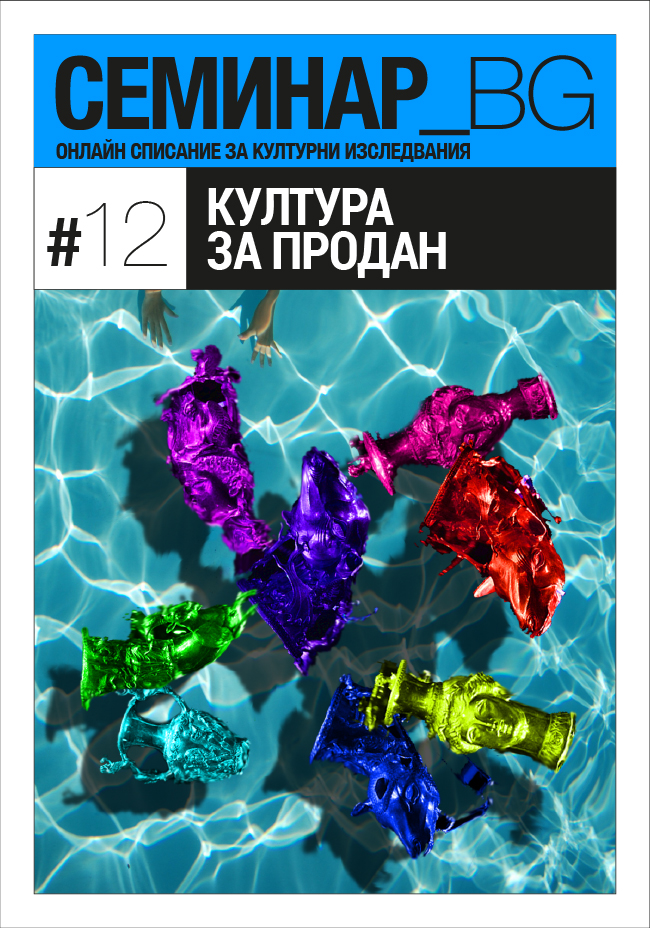
Keywords: Beglika free fest; festival indusctry; green movement
A connection between the latest trends in the development of the music industry with the search for social change of the massive movements from 2013 in Bulgaria is outlined in the text. After the digital turn and the spread of technologies of free file-sharing, the record industry has lost a significant share and consequently has turned to live music and festivals, which have become the “new” post-digital cultural industry. The festival in Beglika, starting in 2008 as a free forum of the green movement in Bulgaria, with the years has embraced the logic of constant growth of the festival industry. But by doing this, it contradicts its own idea which is fundamental for the festival itself as well as for the green movement – the idea that “less is more”. What could be the outcomes of this relation? Shall the green movement and the ideas for social change gain more popularity? Or the festival will loose from its growth?
More...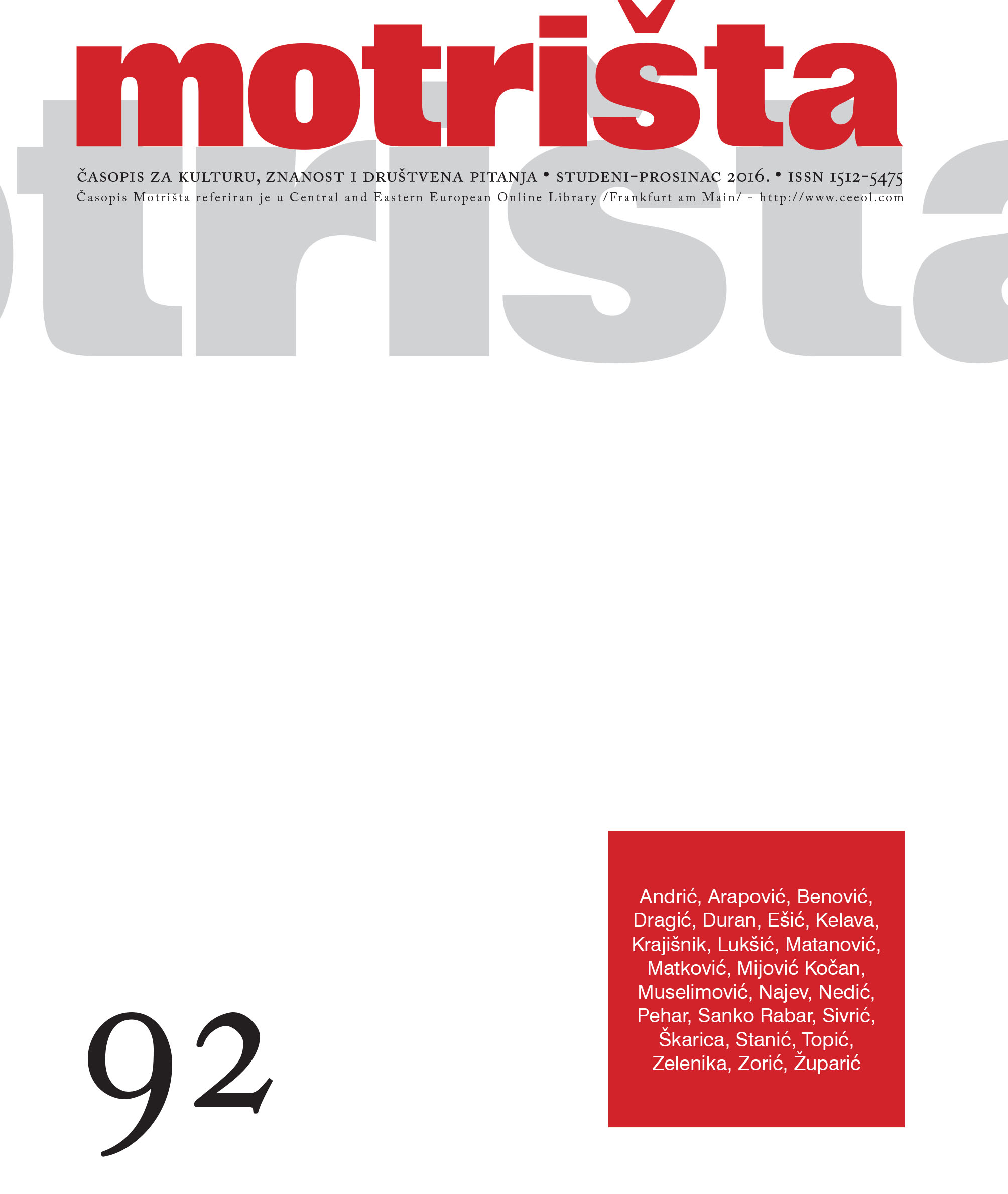
Keywords: Advent; advent wreath; Croatian tradition; folk customs; morning services;
Christmas time in church and folk culture begins with Advent. This period of four Sundays before Christmas Christians experience as a time of preparation for the birth of Jesus Christ. This period is characterized by going to the masses, especially morning services, prayers and fasting. Advent customs such as gift giving, sowing wheat, decorating homes have been preserved to this day and they carry the traces of the past while some other customs do not exist anymore and are remained only in memories of the elderly persons. People in Posušje in a special way worship the holidays of St. Barbara, St. Nicholas, the Immaculate Conception of the Blessed Virgin Mary and St. Lucia. The days of Materice and Očići are associated with giving cina so they took the names Ženska (Female) and Muška (Male) cina. Lately is the custom of advent wreath more and more present in the homes of people of Posušje. Based on the collected contemporary records this paper represents the Advent customs in the area of Posušje. These records of customs take an important place in the folk heritage of Posušje area and the aim of this paper is to preserve the Croatian culture in this area.
More...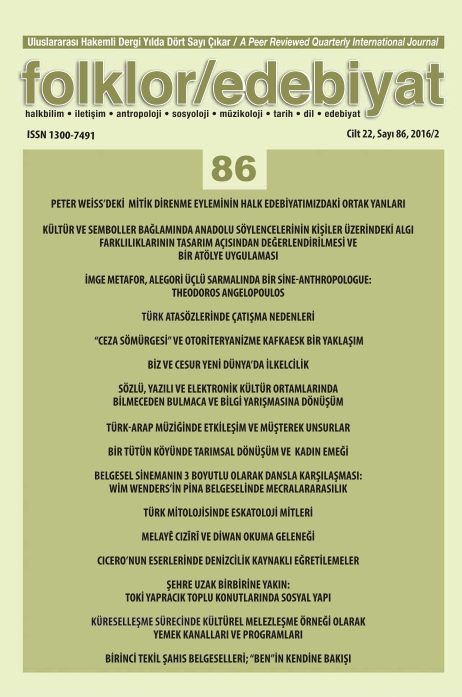
Keywords: figures of speech; metaphor; Cicero; navigation; rhetoric;
Metaphor is derived from the ancient Greek verb metapherein which means to carry across or to transfer. Ancient Roman authors used the word translatio derived from verb transferre. Metaphor is a word or phrase which belongs properly to one subject, but transfered to another on the grounds of similarity or comparison between them. The area from which the proper word is borrowed is denoted by source of the metaphor. Like any other literatures, metaphors are also widely used in Latin literature. The commonest metaphors of Latin poets and writers are derived from navigation and aspects of the sea, farming, breeding animals, slavery, military, fire and flame, hunting and circus games. All these sources, especially navigation and aspects of the sea, are frequently seen in works of Marcus Tullius Cicero, the most significant character of Roman rhetoric, philosophy and politics in 1st BC. In this study, the theories on the definition and purposes of metaphor in ancient rhetorical treatises will be summarized initially, then will be focused on Cicero’s works which includes his judical and deliberative speeches, philospohical treatises and his letters. The metaphors derived from navigation will be detected and categorized on the basis of borrowed words. The aim of this study is to recollect this kind of metaphors as a corpus which scattered among his works. Each category will be commented by selecting examplary phrases and the rest which bears the same meaning will be listed below. Exemplary phrases are in Latin in the main text, translations in footnotes.
More...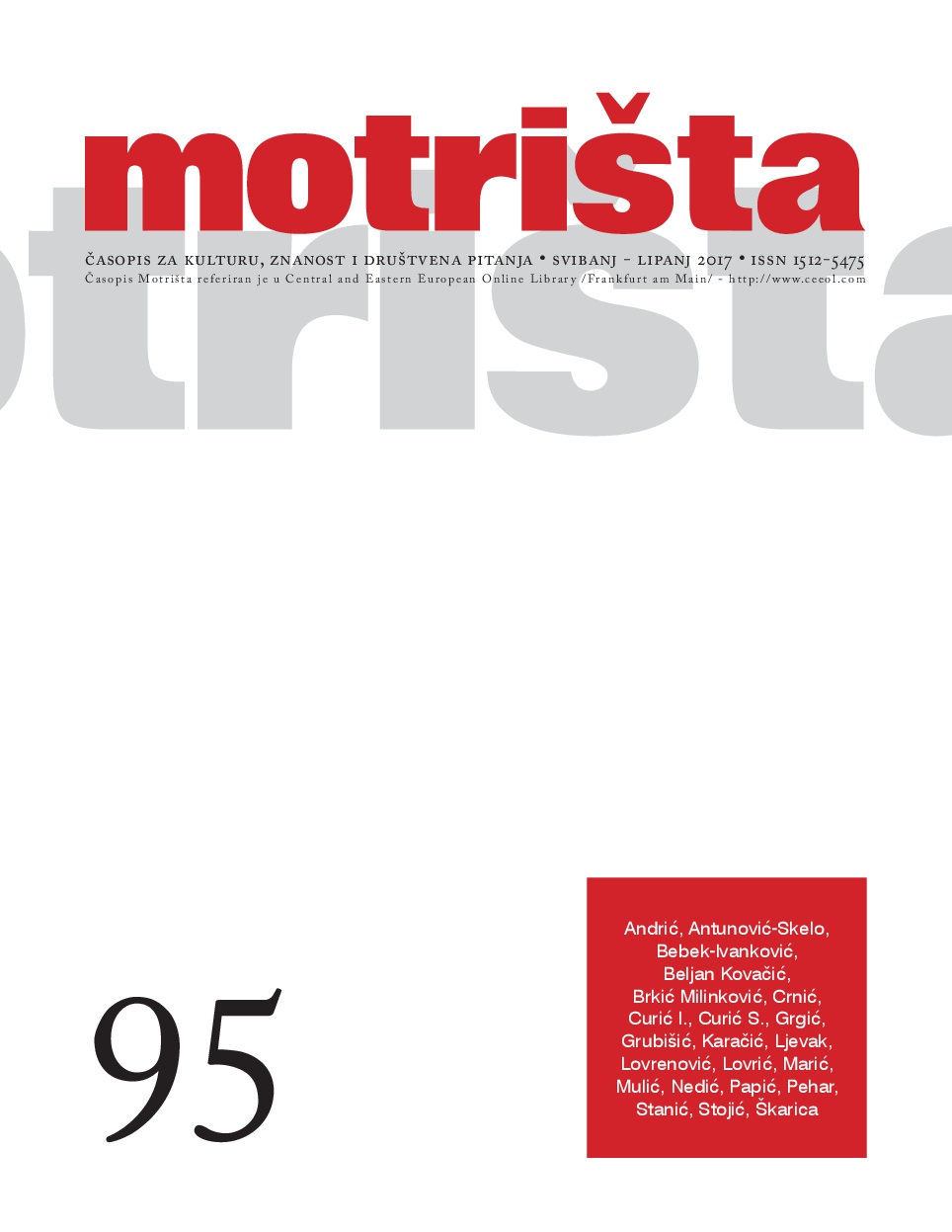
Keywords: Advent; Livno; customs; Christmas Eve; folk songs;
The paper is about Advent customs in Livno area researched between 2008 and 2016. The data were mostly collected by the method of direct interview, and to a lesser extent by indirect interview. Besides field research, the author uses reference books about Advent customs of this area. The period of Advent in Livno area is characterised by fast, devotion, the liturgy of the Mass at Dawn, spiritual and physical preparation for the most joyous feast. The paper explores Christmas preparation of Catholics in Livno, customs for the feasts f Saint Nicholas, Saint Lucy, Saint Thomas the Apostle, Christmas Eve and traditional religious folk songs. The paper also explores beliefs and customs on certain days of this period. The day that is especially rich with customs is Christmas Eve which is the culmination of joyous and festive anticipation of the birth of Jesus. The goal of the majority of the customs is to evoke blessing, happiness and prosperity during the forthcoming year. There are also some customs used to predict if somebody will marry in forthcoming year. The customs were accompanied by folk religious songs about Christmas, the birth of Jesus, Blessed Virgin Mary and saints celebrated during this period.
More...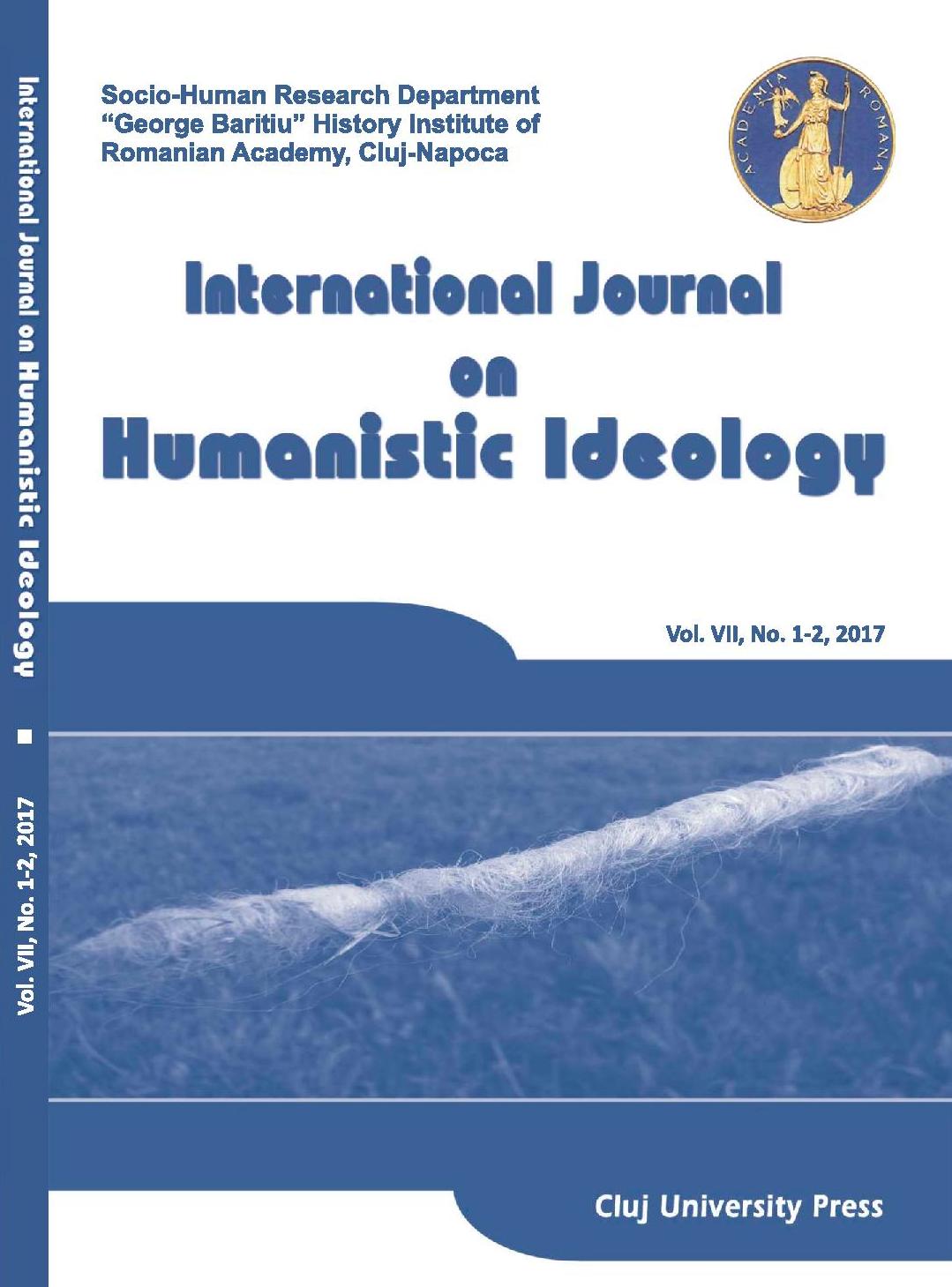
Keywords: emergency; everyday; world of life; ethics; Edmund Husserl
The notion of urgency has lost in the last time its unusual character; it has become "chronic emergency". The exceptional has become routine and the daily urgency tends to become a way of governing, a form of domination, a (political) lifestyle. We try to understand the current use of the term in law by showing how the world of everyday life is the pivot of the phenomenological understanding of normativity. Our focal point was the conception that Husserl had elaborated in texts related to two of his major works: Ideas II and Krisis. The ultimate goal of the essay is to answer the question: how can one insert in a already constituted typicality a differentiation and thus a mastery in such a way that the space of the ethics is opened and that means for a criticism and for a permanent adjustment of it.
More...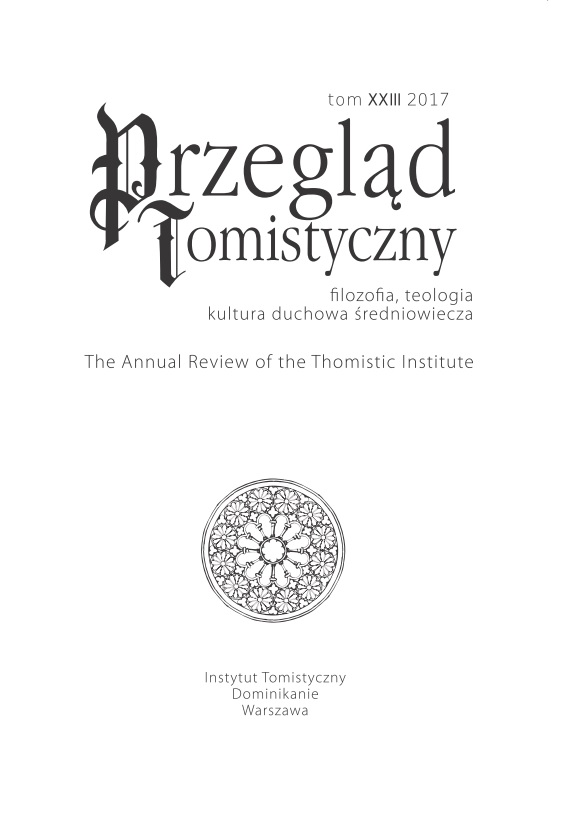
Keywords: Medieval Philosophy;Aristotelianism;Philosophy of nature;
For a modern reader, Walter Burley’s commentaries on Aristotle’s Parva naturalia are a puzzling blend of superstitions and rational arguments. A more detailed analysis of selected issues shows that they are very well integrated within a complex worldview. What is more, the Christian-Aristotelian worldview of those times allowed for critical procedures of data analysis, which enabled scholars of the time to test the everyday beliefs and see whether they can be explained by means of the accepted theories. This way they were able to preserve coherence of the system of knowledge and identify the exceptional cases, which were branded as superstitions.
More...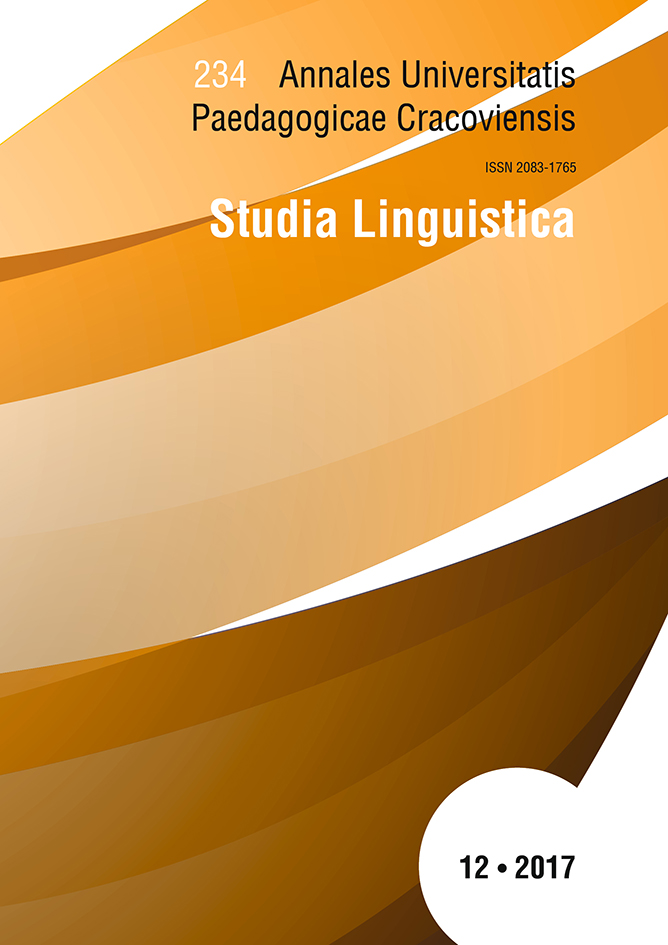
Keywords: history of language; historical semantics; lexicography; lexicology
The article presents the scope of research conducted within regard to historical semantics inPoland. Semanticists do research on the history of word’s and construction’s meaning. Thesources of research materials (dictionaries and texts) are discussed. The on-line ConceptualDictionary of Old Polish is described in detail as one of the sources. Also there are presentedsome achievements of Polish linguists in semantic-historical research.
More...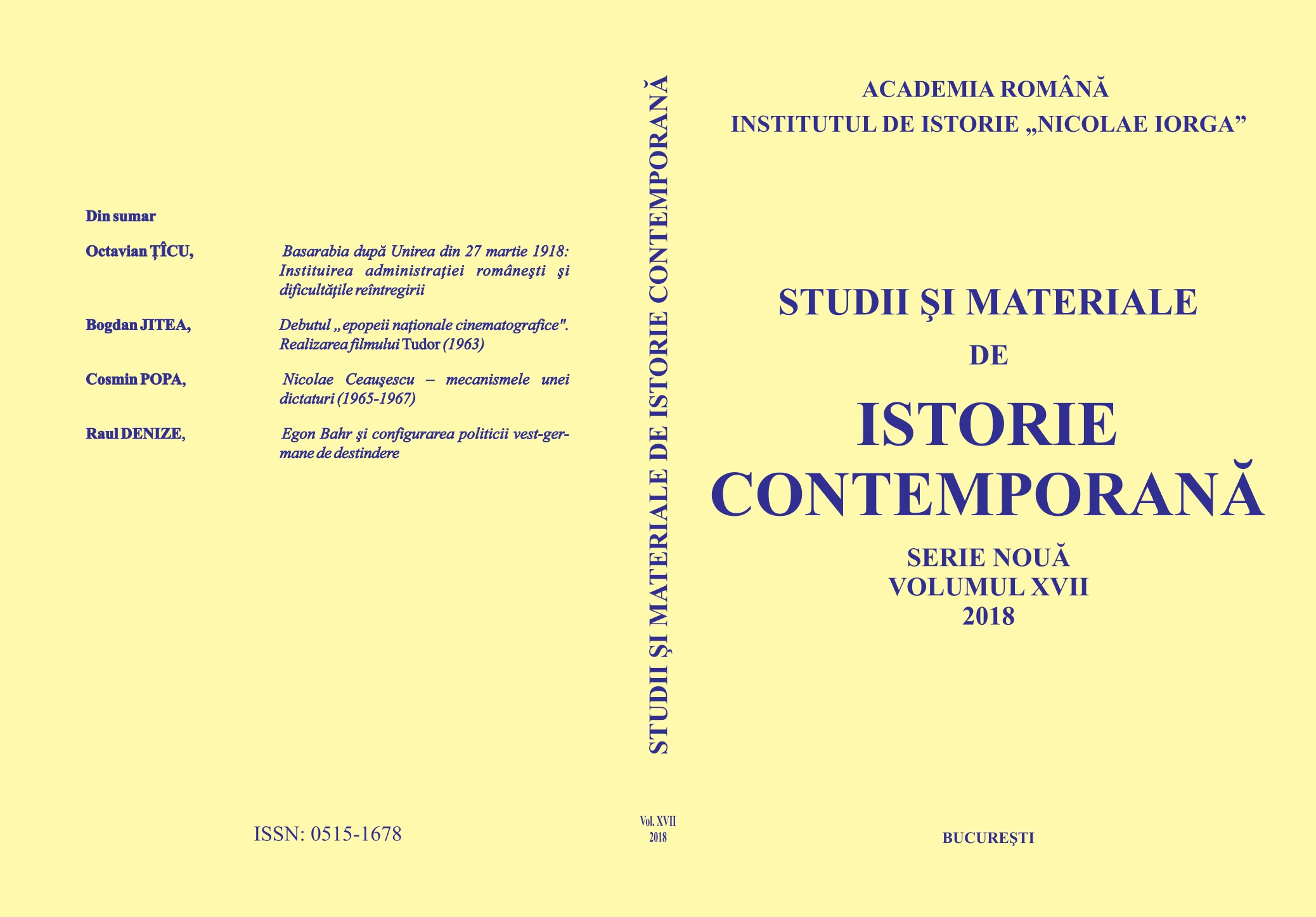
Keywords: Communism; Post-communism; Cultural Memory; Communicative Memory; Memorial regimes;
27 years after the fall of communism in Romania, the public representations of the regime are still mythologically distorted! Nuances of interpretations, although much needed, are scarce and marginalized by the two dominant public narratives which depict communism either as a ‘good idea badly applied’ or as an „illegitimate, criminal regime“.This article provides these nuances by means of studying different approaches and levels of communist remembrance. It allows us to go beyond the two historiographical paradigms circumscribing the memory of Communism: that of victimisation by denouncing the regime’s crimes and abuses, and that of general culpability, suggesting that all Romanians are responsible for the existence and endurance of Communism.My aims is twofold: on the one hand to show how memorial regimes are instrumental in forging a cultural memory of communism in Romania, and, on the other, to understand how people (former detainees, deportees and ordinary people) relate to their communist past and experiences. The article emphasizes the importance of the official memorial discourse in shaping personal narratives on communism.
More...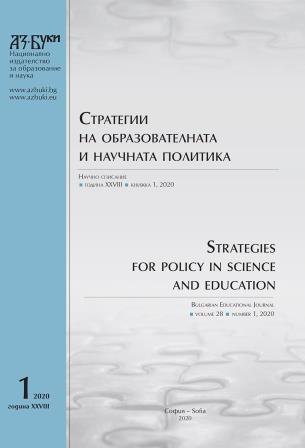
Keywords: CEEOL; database; humanities; social sciences; publishers; libraries; Bulgaria
During the last twenty years, Central and Eastern European Online Library (CEEOL) became a leading database and repository offering a highly specialized and comprehensive collection of full text indexed documents in the fields of Humanities and Social Science publications from and about Central and Eastern Europe. Journal articles, eBooks and Grey Literature items are included in 50+ languages, allowing access to the primary source in one repository and fostering the language diversity in academic research and publishing. The dissemination process of the content in CEEOL includes the following discovery systems: Google Scholar, ProQuest´s Serial Solutions, Summon, Primo Central, Alma, EBSCO´s EDS Discovery Service and Knowledge Base, TDNet and OCLC. The CEEOL´s partnership with Clarivate Analytics allows Web of Science editors having access to the CEEOL platform for easier analysis, selection and indexing of CEEOL journals that interest the Web of Science community. Institutional subscribers (states’, universities’, institutes’ libraries, etc.) worldwide appreciate CEEOL for providing researchers, scholars, students, librarians and library patrons the access to indexed and archived Journals, eBooks and Grey Literature documents from and about Central and Eastern Europe by leading academic and scholarly publishers. The Bulgarian collection of journals and books holds a special place in CEEOL due to the high quality of scientific content and the depth and the completeness of the digital archives of the Bulgarian periodicals. CEEOL is a unique source of information for the development of Bulgarian humanities and social sciences for the past over 30 years, and that source could be used more widely in Bulgaria for supporting this development in the future. The study uses a comparative approach and analyzes the results of some of the business analytics tools of the CEEOL system.
More...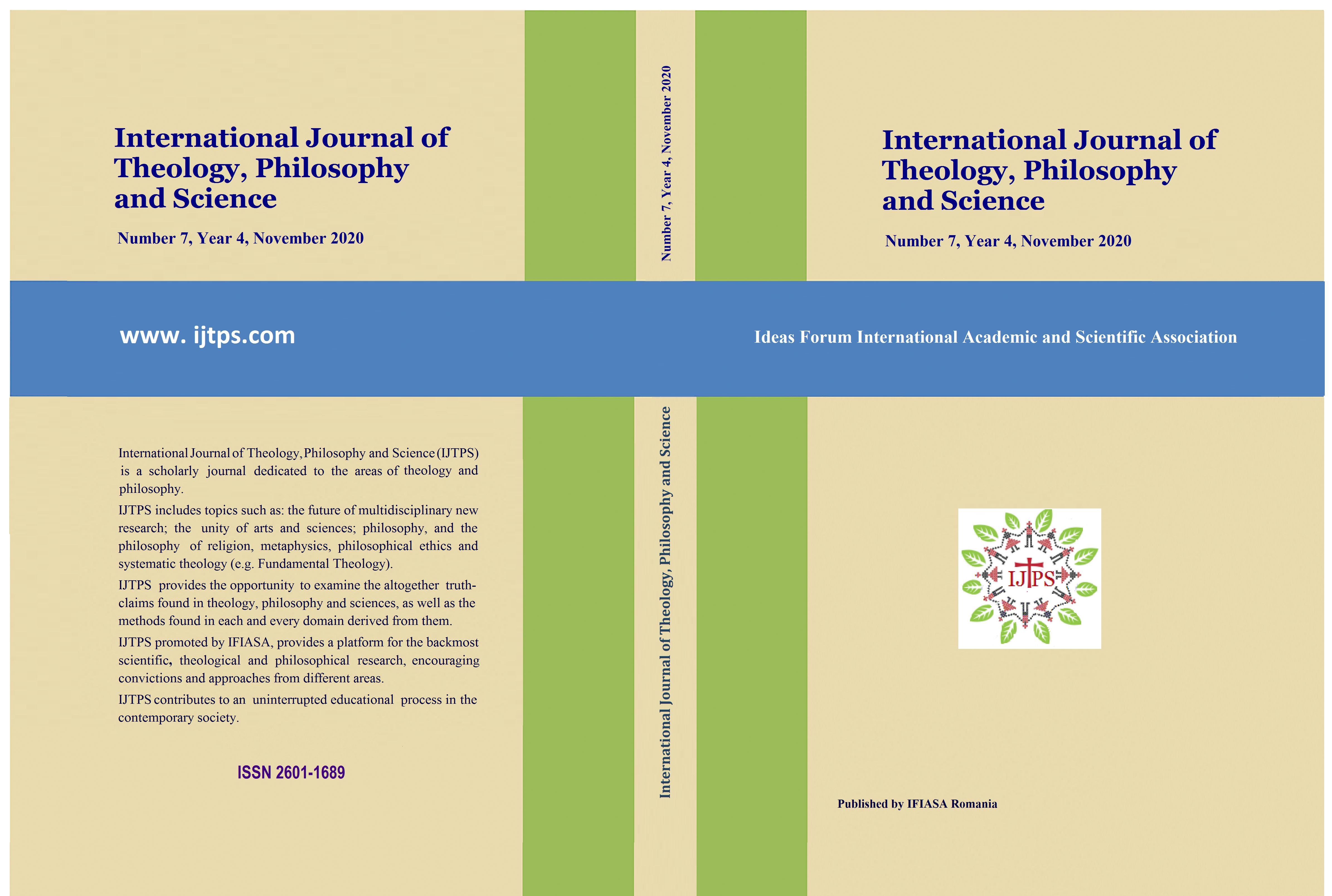
Keywords: Pascal; Happiness; Volitive abyss; Heart and Reason; God;
The purpose of this paper can be resumed as the attempt to, in a first moment, delineate themanner through which, according to Pascal, we access the world – and here there is alreadythe presuppositional thesis that there is effectively at least one way to access the world as theworld that it is -, in what conditions that access is made, both relating to the subject and themilieu in which the subject finds himself (that is, taking into account the conditioning world,as well as the limitations which are inherent to a subject that is rooted in the world), and,finally, to inquire the possibility – and, if the possibility is affirmed, to investigate if there issuch thing as a necessity – of modifying the way of being in the world, in view of replenishingthe profound abyss that exists in a will eager of attaining happiness.
More...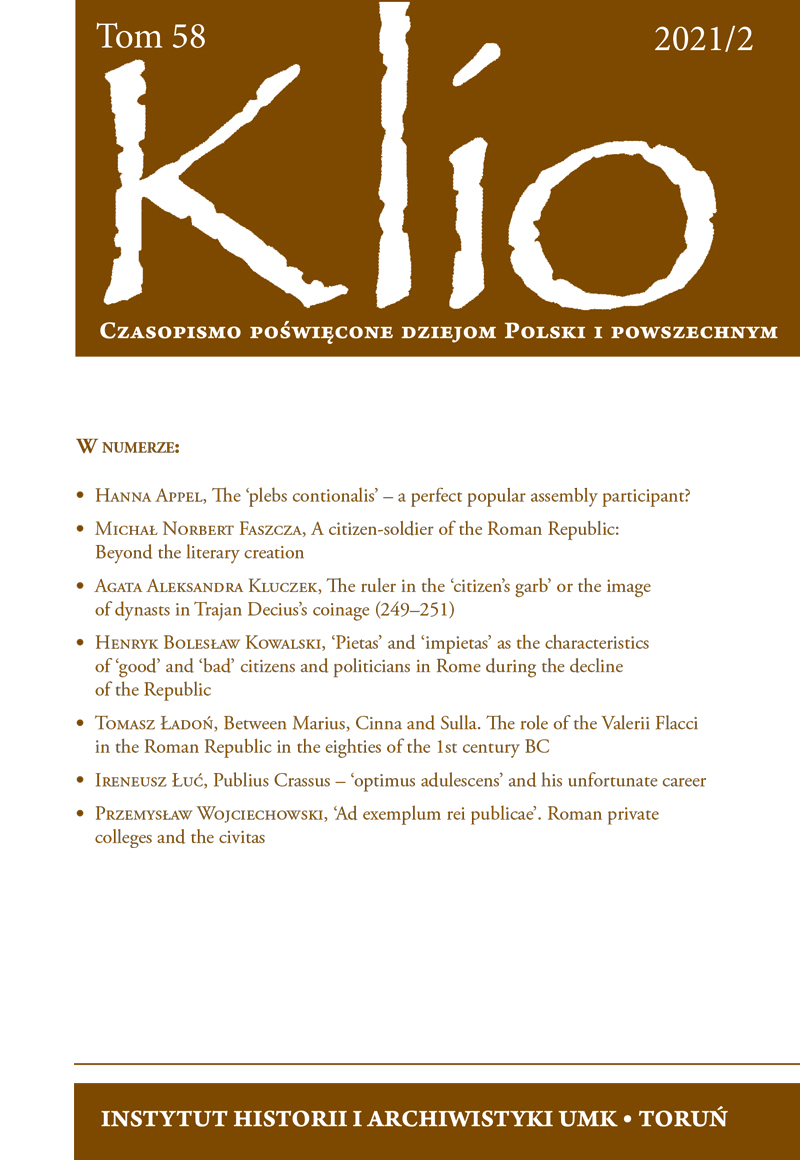
Keywords: Valerii Flacci; Sulla; Marians; Cinanns; Sullans; First Civil War
Valerii Flacci was one of the most influential families in Rome in the first two decades of the 1st century BC. Cicero called them a nobilissima familia, while they them-selves were the apple of the Roman aristocracy and were perceived as the best citizens (optimi cives). During the First Civil War, they were initially associated with the Marian camp. L. Valerius Flaccus (consul of 100 BC) acted as princeps senatus since 86 BC, and his cousin, also L. Valerius Flaccus was consul suffectus in 86 BC, after the death of C. Marius. The brother of L. Valerius Flaccus, Caius, consul of 93 BC, during the reign of Cinna in Rome was the governor of Spain for many years, and later of Transalpine Gaul too. It is known that Valerii Flacci wanted to reach a compromise between Sulla and the Marian camp, and when their efforts failed, they opted for Sulla. Despite the significant role Valerii Flacci played in the Republic, their activities remain overshadowed by other figures of that period. Also, their switch to the Sulla camp in the memory of the ancients was quite poorly recorded, especially when compared with the publicity of the transition of figures such as Metellus Pius, Pompeius or Crassus to Sulla’s side. The author of the presented paper will attempt to coax Valerii Flacci out of the shad-ows of history, examine the genesis of their defection to the Sulla camp and determine the role they played in this camp in the initial period of Sulla’s dictatorship.
More...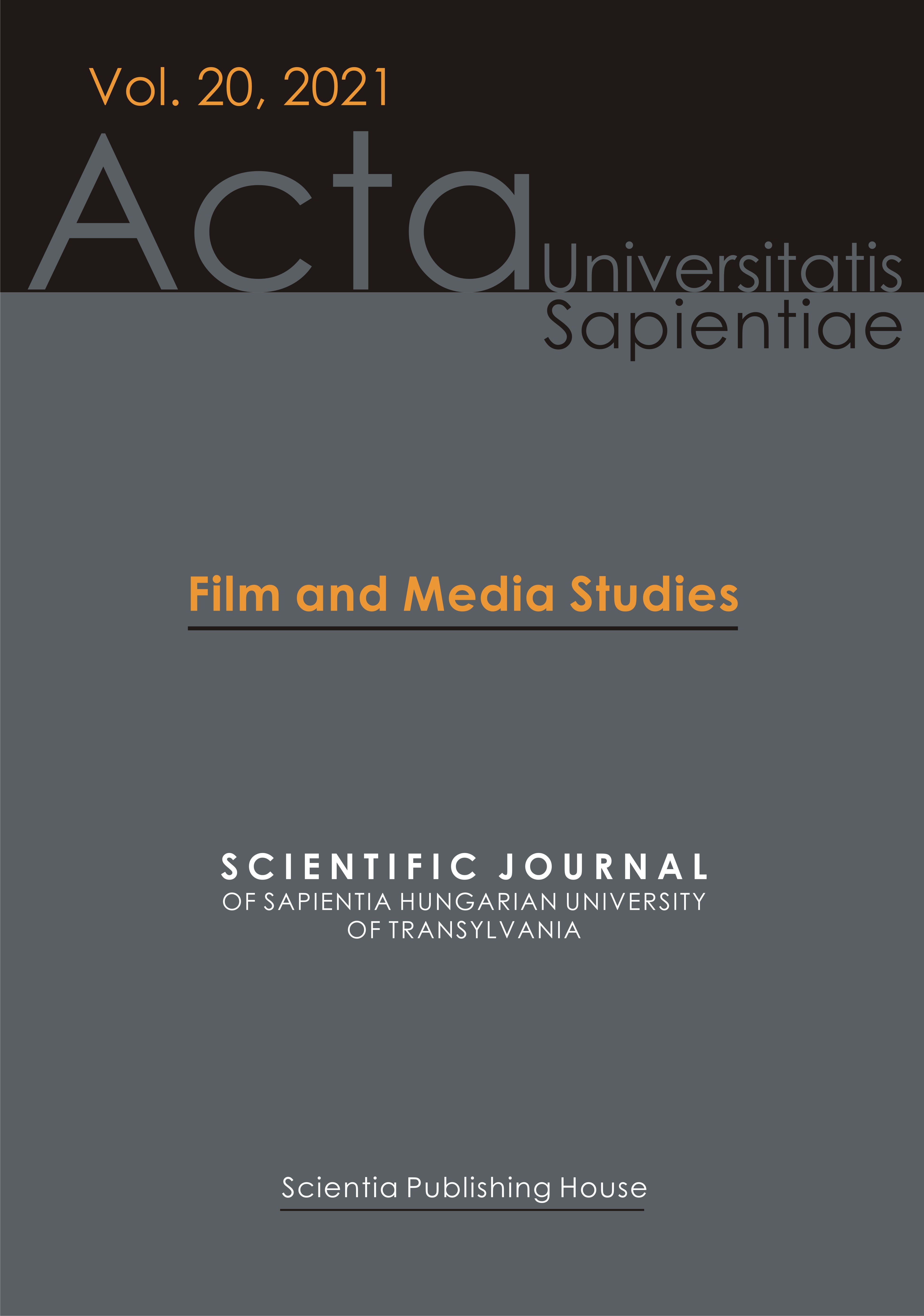
Keywords: educational film; state socialism; border zone; Hungary; instrumentalization;
Analysing the output of the Hungarian Ministry of Interior’s own film studio, which produced educational films between 1955 and 1989, this essay investigates the modes in which the border zone was represented during the decades of state socialism. Considering the vicinity of the border as an area, where ideological confrontations are battled out, the article argues that there is a significant difference between the films produced in the 1950-60s, and those from the mid-1960s onwards. The earlier pieces depict an emotionally charged border zone the defence of which is a social-political duty: father-type superiors teach rookie soldiers about this obligation in coming-of-age stories. However, from the mid-1960s onwards, the films seem to confine themselves to an instrumental mode of persuasion, which presents border protection as a merely technical question. The article briefly ties these shifts to the changing modes in official discourses during the decades of state socialist Hungary.
More...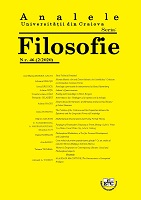
Keywords: human divination; sacred divination; signs of the gods; natural intuition; divine enthusiasm; divine dreams; theophoria; divination by oracles; divination by light; theurgy;
Concerned with an ethical and ontological model of man aimed at his fulfilment in divine perfection, Iamblichus criticizes the principal human forms of divination, in order to describe, as opposed to them, the authentic form of divination, namely sacred or divine divination. Its principle is the following: the knowledge of the cause and essence of becoming leads us to the knowledge of the future. The ability to make predictions about the future is only granted to the gods, because they have a universal knowledge, but the gods offer their power to men that are capable to participate in the divine. This sacred divination occurs only in theurgy, which ultimate goal is the union of the theurgist with divinity, and the authentic divination is the crowning of the theurgy.
More...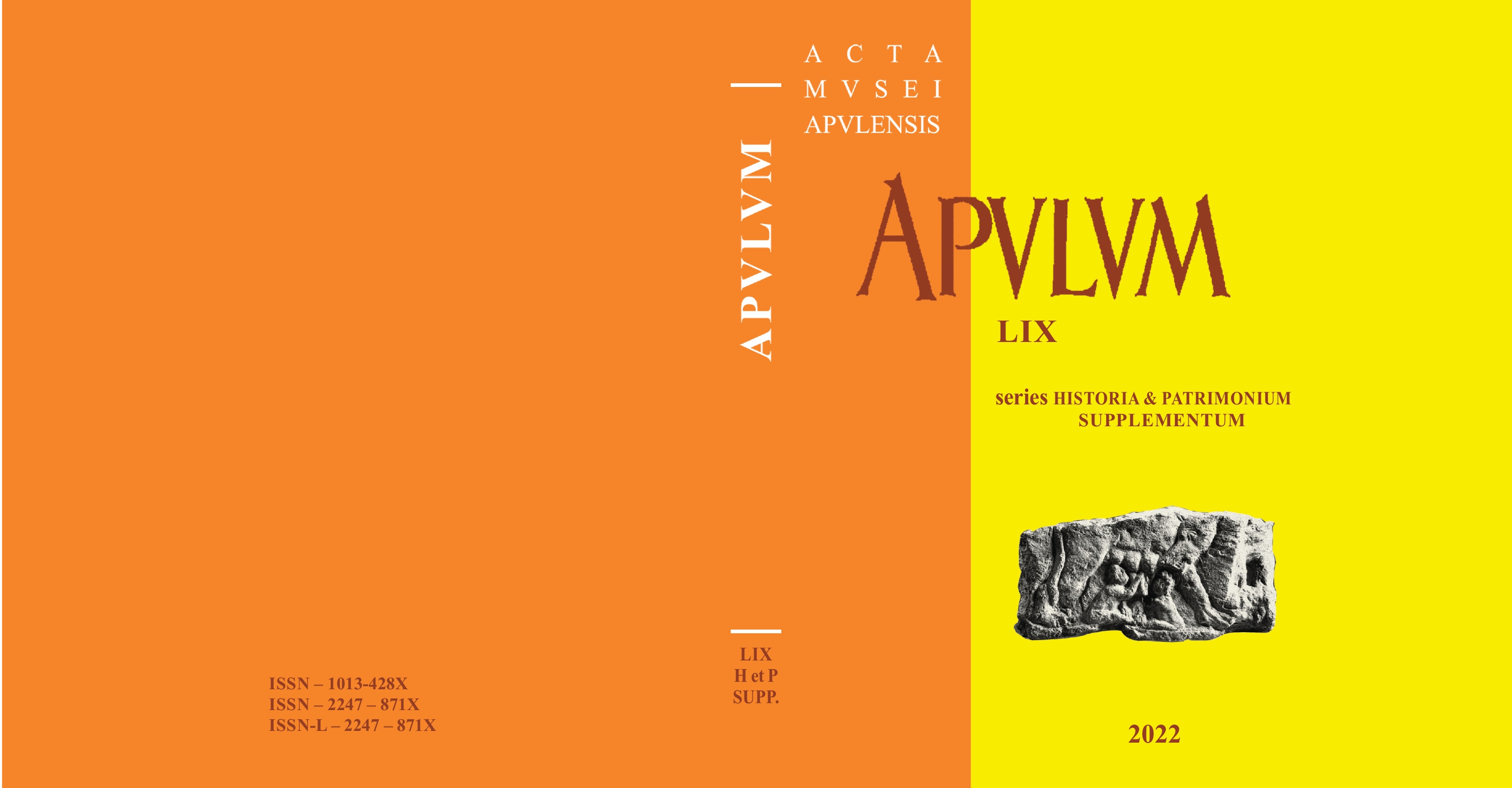
Keywords: history of libraries; Nicolae Mavrocordat; Constantin Mavrocordat; Alexandru Mavrocordat; Văcăreşti Monastery; ex libris;
As in other European countries, the first private Romanian libraries belonged to the rich and powerful, the only ones able to train themselves and afford to collect books. In the Romanian countries, there was no environment that would allow, if not stimulate, normal evolution of the library universe and due to the fact that power was often unstable and vulnerable. However, the emphasis shifted to diplomatic strategies during the seventeenth and eighteenth centuries. The political power had to be informed, to resort to the ”power of the library”. In this context, the Romanian humanities libraries are obviously not created only for purely intellectual and aesthetic pleasure and the researchers' attempt to reconstruct them proves it. They often contain what was needed to be known for the political purposes pursued at the time.The history of Romanian libraries records quite a bit of information, most disparate, about the first libraries set up, because most of them were scattered or destroyed. In those days, the instability of the Power led to general instability, so that it was quite difficult to accumulate books and lay the foundations of a library on a scientific basis, when even the initiators of such actions often had a tragic destiny, destiny followed by their books. The Mavrocordats’ Library is one of them, occupying a special place in the cultural life of the Romanian countries both by the intrinsic value of the cultural act it represents and especially by the impact it had on their political and socio-cultural development, being impossible to dissociate the reforms of the Mavrocordats from their intellectual formation which, in turn, cannot be categorically dissociated from their books, and therefore from the library. In this article, we try to bring to the attention of connoisseurs the history of this library.
More...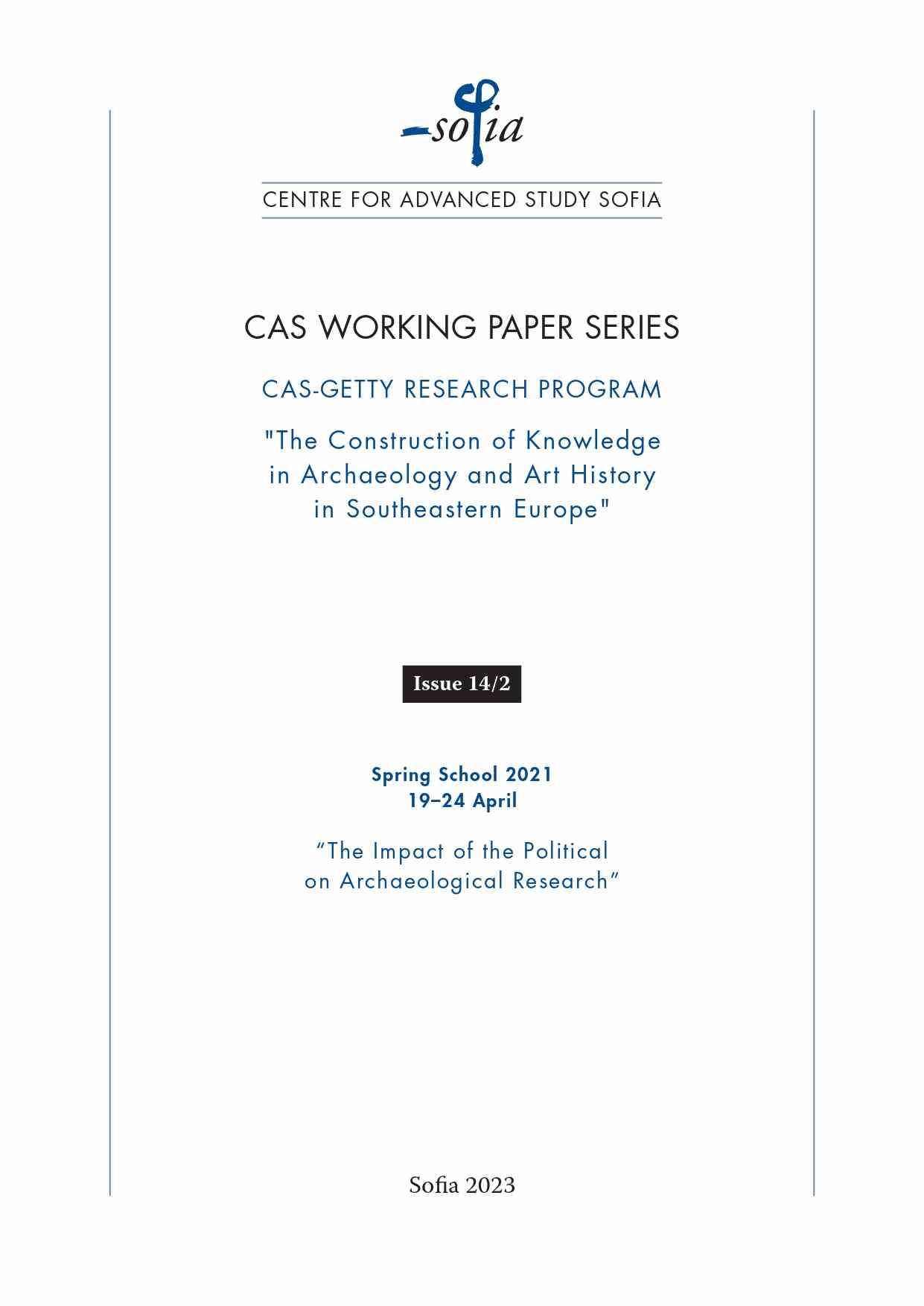
Keywords: archaeology; autonomy; sociology of scientific knowledge
Archaeologists should stay away from politics as practised in the political field by paying attention to inconspicuous forms of intrusion, such as evaluation, interdisciplinarity, and the growing importance of individual credibility. The autonomy of the discipline is enhanced by rejecting ways of thinking that belong to politicized common knowledge.
More...